
Munich is the capital and most populous city of the Free State of Bavaria. With a population of 1,578,132 inhabitants as of 31 May 2022, it is the third-largest city in Germany, after Berlin and Hamburg, and thus the largest which does not constitute its own state, as well as the 11th-largest city in the European Union. The city's metropolitan region is home to about 6 million people.
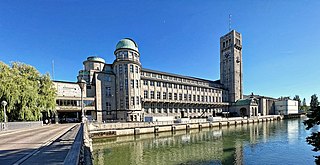
The Deutsches Museum in Munich, Germany, is the world's largest museum of science and technology, with about 28,000 exhibited objects from 50 fields of science and technology. It receives about 1.5 million visitors per year.
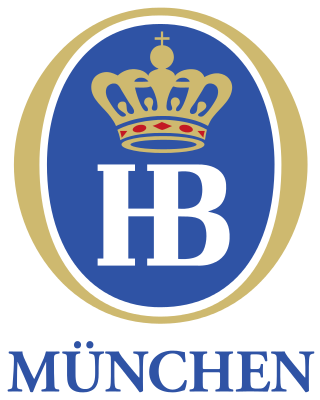
The Staatliches Hofbräuhaus in München is a brewery in Munich, Germany, owned by the Bavarian state government. The Hof (court) comes from the brewery's history as a royal brewery in the Kingdom of Bavaria. The brewery owns the Hofbräuhaus am Platzl, the Hofbräukeller and one of the largest tents at the Oktoberfest (Hofbräu-Festzelt).
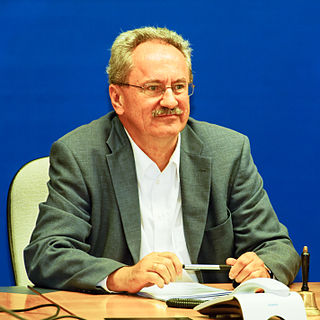
Christian Ude is a German politician who served as mayor of Munich from 1993 to 2014. He is a member of the German Social Democratic Party.

The Bergkirchweih is an annual Volksfest in Erlangen, Germany. Locals nickname it Berch, which is the East Franconian pronunciation of the German word Berg, meaning mountain or hill.
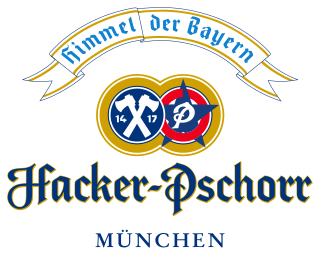
Hacker-Pschorr is a brewery in Munich, formed in 1972 out of the merger of two breweries, Hacker and Pschorr. Hacker was founded in 1417, nearly a century before the enactment of the Reinheitsgebot beer purity law of 1516.

Augustiner-Bräu is a brewery in Munich, Germany. Established in 1328, it is Munich's oldest independent brewery. The company is owned by the Edith Haberland Wagner Trust 51% and the Inselkammer-Family 49%.
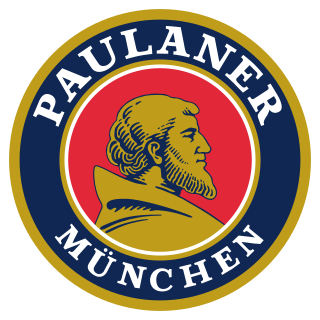
Paulaner is a German brewery, established in 1634 in Munich by the Paulaner Order of mendicant friars. Now owned by the Schörghuber family, it is one of the six breweries which provides beer for Oktoberfest. Paulaner ranks number six among Germany's best-selling beers.

Kitchener–Waterloo Oktoberfest is an annual nine-day festival in the twin cities of Kitchener–Waterloo, Ontario, Canada. Based on the original German Oktoberfest, it is billed as Canada's Greatest Bavarian Festival, and is the second-largest Oktoberfest in the world. It is held every October, starting on the Friday before Canadian Thanksgiving and running until the Saturday after. Estimates indicate that the event attracts roughly 700,000 visitors to Waterloo Region, Ontario every year.
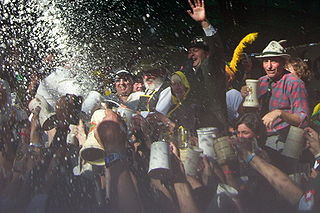
The Oktoberfest is a two-week festival held each year in Munich, Germany during late September and early October. It is attended by six million people each year and has inspired numerous similar events using the name Oktoberfest in Germany and around the world, many of which were founded by German immigrants or their descendants.

Oktoberfest is the world's largest Volksfest, featuring a beer festival and a travelling carnival, and is held annually in Munich, Bavaria, from mid- or late-September to the first Sunday in October, with more than six million international and national visitors attending the event. Locally, it is called d'Wiesn, after the colloquial name for the fairgrounds, Theresienwiese. Oktoberfest is an important part of Bavarian culture, having been held since the year 1810. Other cities across the world also hold Oktoberfest celebrations that are modeled after the original Munich event.

There are a series of tents at the Oktoberfest, which are operated by different Wiesn-hosts and in which some come from a long tradition. Some tents belong to the local breweries. The setup work for the tents often begins three months before the start of the festival.
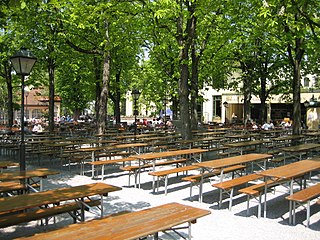
Nockherberg is the name of a small terrace on the slope of the eastern bank of the Isar in Munich, situated in the urban district of Au. An annual beer festival rich in tradition takes place there in the Paulaner Brewery - the Salvator-Ausschank auf dem Nockherberg The name of the raised terrace is often used synonymously for this festival or its opening event, the tapping of the first barrel of a strong, seasonal beer (Starkbieranstich).
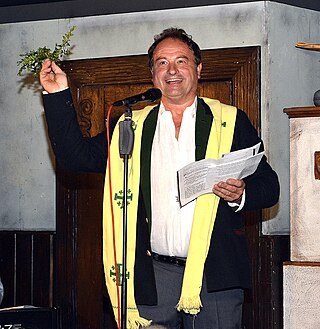
Rainer Maria Schießler is a German Roman Catholic priest. Due his unconventional style of pastoral ministry and his presence in the media he is said to be one of the most famous men of the church in Bavaria.

Bits & Pretzels is a three-day conference for founders and enthusiasts from the start-up scene, which takes place in Munich, Bavaria, Germany, during the Oktoberfest. So far, speakers included international and national founders and investors, among them the founders of Virgin, Airbnb, Lottoland, Shazam, Tinder, Zendesk and Evernote. The goal of the event is inspiration through lectures and the networking of the participants among each other.

The Fischbrunnen is a fountain in the center of Munich, whose history can be traced back to the Middle Ages. In 1954, Josef Henselmann created the fountain in its present form, using parts of Konrad Knoll’s neo-gothic fountain that was destroyed during the Second World War.

The Bahnwärter Thiel is a techno club, music venue and alternative cultural center in Munich, Germany. It is named after the novella "Bahnwärter Thiel" by German author Gerhart Hauptmann.
The East-West Peace Church, also known as the Church of Father Timofej, was a chapel in the Olympiapark in Munich. It was built by the Russian hermit Timofej Vasilyevich Prokhorov and his wife Natasha, without a building permit, right next to their residential hut, which they had also built themselves.
Michael Harald Glück is an Austrian professional footballer who plays as a defender for 1860 Munich. He has also played for 1860 Munich II and Hessen Kassel.




















